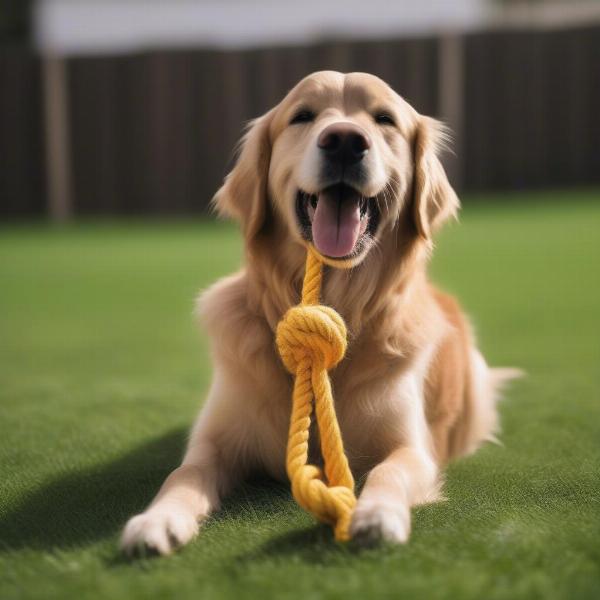Dog chew toys are essential for a dog’s physical and mental well-being. They help satisfy a dog’s natural instinct to chew, keeping them entertained and preventing destructive behavior. Choosing the right chew toy can be a daunting task, given the wide variety available. This guide provides valuable insights into selecting the perfect dog chew toy, considering factors like size, breed, and chewing habits.
Why are Dog Chew Toys Important?
Chewing is a natural and necessary behavior for dogs. It helps them relieve stress, boredom, and anxiety. Puppies, especially, chew to soothe teething pain. Providing appropriate dog chew toys can prevent them from turning to furniture, shoes, or other household items for chewing satisfaction.  A Happy Dog Chewing a Toy
A Happy Dog Chewing a Toy
Benefits of Chew Toys for Puppies
Puppies experience teething discomfort, much like human babies. Chew toys provide a safe and effective way to alleviate this pain and promote healthy dental development. They also help puppies learn appropriate chewing habits, preventing destructive behavior later in life.
Benefits of Chew Toys for Adult Dogs
Even after their teething phase, adult dogs benefit significantly from regular chewing. It helps maintain strong jaw muscles, clean their teeth, and prevent tartar buildup. Chew toys also provide mental stimulation, reducing boredom and the likelihood of destructive behavior.
Choosing the Right Chew Toy
With a plethora of options available, selecting the right dog chew toy can seem overwhelming. Consider your dog’s size, breed, and chewing habits when making your selection. For aggressive chewers, opt for durable toys made from tough materials. small dog chew toy are specifically designed for smaller breeds.
Size and Breed Considerations
A toy that’s too small can be a choking hazard, while a toy that’s too large can be difficult for your dog to grip and enjoy. Consider your dog’s breed and jaw strength as well. Small breeds might prefer softer toys, while larger breeds may need more durable options. large dog chew toys are a better fit for bigger dogs.
Chewing Habits
Observe your dog’s chewing habits. Are they gentle chewers or aggressive chewers? For aggressive chewers, look for toys made from robust materials like nylon or rubber. dog toys and chews offer a variety of options for different chewing styles.
Types of Dog Chew Toys
There are numerous types of dog chew toys available, each with its unique benefits.
Rubber Chew Toys
Rubber toys are durable and come in various shapes and sizes, making them a popular choice. They can be filled with treats to provide an extra layer of engagement.
Rope Toys
Rope toys are great for playing tug-of-war and satisfying a dog’s natural instinct to gnaw. They also help clean teeth and massage gums.
Plush Toys
Plush toys offer comfort and companionship, especially for puppies or anxious dogs. However, they may not be suitable for aggressive chewers.
Edible Chew Toys
Edible chews provide a tasty and long-lasting chewing experience. They can be made from various materials, such as rawhide, bully sticks, or sweet potato. chew toys for big dogs often include durable edible options.
Maintaining Dog Chew Toys
Regularly inspect your dog’s chew toys for signs of wear and tear. Replace any damaged toys to prevent choking hazards or ingestion of small pieces. dog toys for aggressive chewers may require more frequent replacements.
Cleaning and Storage
Clean your dog’s chew toys regularly to prevent the buildup of bacteria. Most toys can be washed with soap and water. Store toys in a clean, dry place when not in use.
Conclusion
Dog chew toys are a vital part of a dog’s overall health and well-being. Choosing the right chew toy can provide hours of entertainment, prevent destructive behavior, and promote good dental health. Remember to consider your dog’s individual needs and preferences when making your selection.
FAQ
- How often should I replace my dog’s chew toys? Replace any toy that shows signs of damage or wear.
- Are rawhide chews safe for my dog? While generally safe, some dogs may experience digestive issues with rawhide. Monitor your dog closely and consult your veterinarian if you have concerns.
- What should I do if my dog swallows a piece of a chew toy? Contact your veterinarian immediately.
- Can I give my dog a chew toy while I’m not home? Supervise your dog with new chew toys. Once you’re confident they won’t swallow large pieces, you can leave them with a toy while you’re away for shorter periods.
- What are the best chew toys for aggressive chewers? Look for durable toys made from materials like nylon or hard rubber.
- Are there any chew toys that can help with my dog’s teething pain? Yes, rubber and rope toys can help soothe teething discomfort. You can also freeze them for added relief.
- Can chew toys help with my dog’s anxiety? Chewing can be a calming activity for anxious dogs. Consider offering a durable chew toy during stressful situations.
ILM Dog is your trusted source for expert advice on all aspects of dog care, including breed selection, health, training, nutrition, grooming, and product recommendations. We offer a wealth of information to help you provide the best possible care for your canine companion. For personalized guidance, contact us at [email protected] or call +44 20-3965-8624. ILM Dog is committed to helping you build a strong and loving bond with your furry friend.